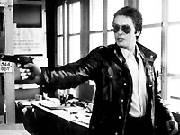|
|
||||
|
by Donald Levit  If his people had hoped that the 1969 politics-murder-sex-drugs trial would hoist Alain Delon to higher international pecking order rungs, they were disappointed. Although more than ever popular in France, Delon and then-wife actress Natalie were cleared but reprimanded, and he would never achieve the embrace enjoyed in this country by Belmondo, Montand and Signoret, Moreau, Deneuve, Bardot and Chevalier or even the fame of his directors, Clément, Melville, Godard, Visconti, Antonioni and the French-based Losey. A César Award a decade-and-a-half later, plus aggressive ventures into writing, production and directing, and great popularity in China and Russia, yet the actor remains second-tier here, perhaps, like John Derek, too chillingly pretty to be taken seriously. Double entendre, "Man in the Shadows" is thus a fitting title for the two-part Delon series at Lincoln Center, July 11-21 and July 29-August 7. Organized in conjunction with the French government in Paris and New York, the eighteen-film retrospective covers its subject as actor, director and writer over thirty of his fifty-year, seventy-five-film career. Jacques Deray's 1968 The Swimming Pool is rather dismal and all visual. In that faded color of the era -- though here suitable for the blanched Mediterranean countryside -- it creeps to an inevitable act of violence that occurs so late as to be lost (along with interest). A Gallic Inspecteur solves the crime one does not care about -- but, lacking hard evidence, leaves two lovers suspicious and stuck with one another. Staging a for once believable urban car chase, and with a grey longhaired twin standing in for S.P.E.C.T.R.E. Blofeld's white cat, a dozen years later Deray directed the harder looking actor as a professional card gambler turned James Bondian sans-les-gadgets-de-Q in Three Men To Kill. Unluckily coming upon what seems an automobile accident, Delon's Michel Gerfaut is targeted by others in a web of mistaken identity, political hanky-panky, murder and illegal (as opposed to legal) arms sales. His character softened by interplay with his mother (Simone Renant) and an Italian girlfriend (Dalila Di Lazzaro) concerned that "my breasts are smaller in the morning," Michel rises too easily to the occasion as driver, plotter and gunman. His goal is gallant and disinterested, and although his ultimate naïveté is but one implausibility among many, the film is as entertaining on its level as most such fare. Made, and screened, between these two and based on a Georges Simenon novel, The Widow Couderc is undeservedly ignored, left unmentioned in numerous film guides, perhaps because of its quietness or -- dangerous ground -- directeur Granier-Deferre's unflattering end picture of 1934 France's opening its fascist, Waco-overkill totalitarian heart. Moustached, taciturn, Delon is tailored for the part of drifter-"hobo" Jean Lavigne (whose radical past is revealed in too-quick French end-titles). Helping a woman carry a thirty-kilo cement insulator for incubating eggs, he is hired for three days at her dilapidated farm. Overweight and greying at fifty, Simone Signoret's Widow is restrained yet seething underneath, the very opposite of her in-laws' sensuous daughter Félicie (Ottavia Piccolo), a barefoot child-mother. Drawn into this world -- he is a country boy -- and this world drawn into him, Jean is torn two ways but, unreflective and innocent himself, sees nothing amiss. An unwitting lightning rod for hidden passions that surround him, he cares for --perhaps even loves -- children, woman and others, as they come to love, or hate, him. There are wonderful faces and knowing looks washing clothes in the canal, and a moving glorious moment of Signoret's face above a new salmon nightgown, as the two rival women reach love and selflessness in the surprising (and frightening) dénouement. We have suspected something, but hardly this. Three movies, or eighteen for that matter, cannot, of course, give much more than a hint of such a long, full career as Delon's. Never terribly public, anyway, he is close to seventy now, his most recent efforts done for TV in France. Still, balancing a few favorites with a number of unfamiliar films, "Man in the Shadows: The Films of Alain Delon" should bring his work to a wider audience here. Usually dismissed as merely a pretty-boy/blue-eyed killer, he actually did go beyond that image within, granted, the genre of film policier, or crime films. But genre-typing is also true of many others stars and need not be a limitation. |
||
|
© 2026 - ReelTalk Movie Reviews Website designed by Dot Pitch Studios, LLC |



